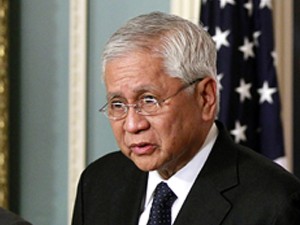DFA: No letup in PH push vs Sino claims
MANILA, Philippines–The Department of Foreign Affairs (DFA) will continue to assert the Philippines’ claims to contested islands in the West Philippine Sea (South China Sea) this year, the country’s top diplomat said.
Foreign Secretary Albert del Rosario said the DFA will forge ahead with the country’s claims by enjoining the other claimant nations to abide by international rules in settling their maritime disputes.
“The DFA will defend President Aquino’s position on what is ours in accordance with the rule of law, including Unclos (United Nations Convention on the Law of the Sea),” said Del Rosario.
The Philippines has been pushing for claimants to abide by the international treaty, which sets a 200-mile exclusive maritime economic zone around countries, and offers a venue for settling disputes.
China, the main rival claimant to the Spratly chain of islands and Panatag (Scarborough) Shoal, has reiterated its position against internationalizing the dispute. It wants to seek solutions through direct talks with its rival claimants.
Article continues after this advertisementChina, however, said it would continue to advocate for a peaceful resolution to the conflict and remained open to the joint development of potential oil and gas resources in the contested areas.
Article continues after this advertisementApart from China, Taiwan, Brunei, Malaysia and Vietnam have partial claims to the Spratlys and its surrounding waters.
China has drawn criticism from rival claimants for stepping up its oil and gas exploration, beefing up sea patrols and fortifying Sansha City, an administrative domain which they established to govern all of the disputed Spratly islands.
China implements new law
Southern China’s Hainan province also began implementing yesterday a new maritime law that allows its authorities to board and search foreign vessels that pass through South China Sea.
The Philippines, on the other hand, earlier this year offered oil exploration contracts in its claimed part of the Spratlys, a move that drew criticism from counter-claimants, especially China.
Last week, the Philippines protested Taiwan’s pronouncement that it would start exploration for oil and gas in waters around Ligao Island, the largest Spratlys island that the Taiwanese call Taiping. China and Vietnam also claim the island.
The DFA stressed that Ligao Island lies within the country’s exclusive maritime economic zone, and that “only the Philippines can explore in those parts of the Spratlys that lie within the country’s 200-nautical mile continental shelf.”
Last year, a standoff between Chinese and Philippine Navy ships occurred over fishing rights around Panatag Shoal, another contested islet.
“We will consistently embrace the firm belief that international law is the great equalizer and that right is might,” Del Rosario told the Inquirer.
The Philippines and China have both expressed hope of a peaceful settlement to the conflict.
Chinese Vice Foreign Minister Zhang Zhijun said in a recent speech in a Beijing media forum that China was against the use of arms to resolve the dispute.
He also expressed China’s openness to jointly exploring the waters for oil and mineral riches, saying that “joint development may still well be a practical approach” in resolving the dispute.
“China advocates the peaceful settlement of international disputes and regional hotspot issues and works vigorously to that end. China opposes the wanton use of force or threat of force. It rejects all forms of hegemonism and power politics,” Zhang said in a Dec. 28 forum of China’s Foreign Ministry.
For comprehensive coverage, in-depth analysis, visit our special page for West Philippine Sea updates. Stay informed with articles, videos, and expert opinions.
